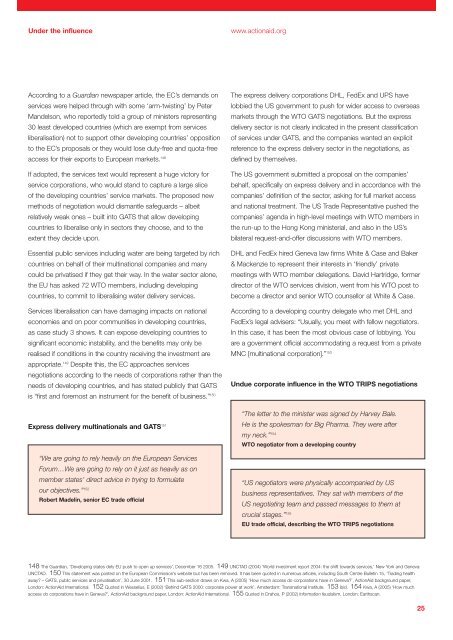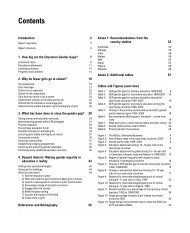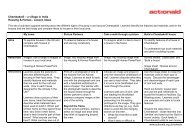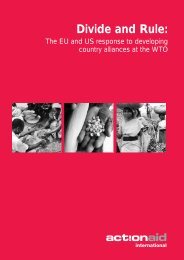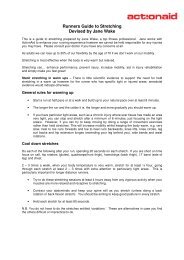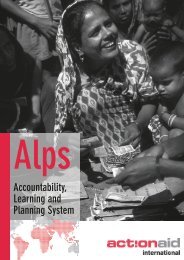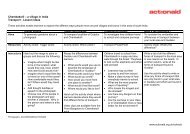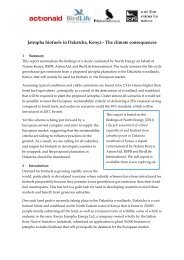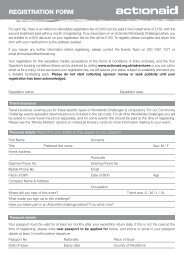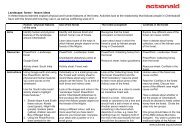UNDER THE INFLUENCE - ActionAid
UNDER THE INFLUENCE - ActionAid
UNDER THE INFLUENCE - ActionAid
You also want an ePaper? Increase the reach of your titles
YUMPU automatically turns print PDFs into web optimized ePapers that Google loves.
Under the influence<br />
www.actionaid.org<br />
According to a Guardian newspaper article, the EC’s demands on<br />
services were helped through with some ‘arm-twisting’ by Peter<br />
Mandelson, who reportedly told a group of ministers representing<br />
30 least developed countries (which are exempt from services<br />
liberalisation) not to support other developing countries’ opposition<br />
to the EC’s proposals or they would lose duty-free and quota-free<br />
access for their exports to European markets. 148<br />
If adopted, the services text would represent a huge victory for<br />
service corporations, who would stand to capture a large slice<br />
of the developing countries’ service markets. The proposed new<br />
methods of negotiation would dismantle safeguards – albeit<br />
relatively weak ones – built into GATS that allow developing<br />
countries to liberalise only in sectors they choose, and to the<br />
extent they decide upon.<br />
Essential public services including water are being targeted by rich<br />
countries on behalf of their multinational companies and many<br />
could be privatised if they get their way. In the water sector alone,<br />
the EU has asked 72 WTO members, including developing<br />
countries, to commit to liberalising water delivery services.<br />
Services liberalisation can have damaging impacts on national<br />
economies and on poor communities in developing countries,<br />
as case study 3 shows. It can expose developing countries to<br />
significant economic instability, and the benefits may only be<br />
realised if conditions in the country receiving the investment are<br />
appropriate. 149 Despite this, the EC approaches services<br />
negotiations according to the needs of corporations rather than the<br />
needs of developing countries, and has stated publicly that GATS<br />
The express delivery corporations DHL, FedEx and UPS have<br />
lobbied the US government to push for wider access to overseas<br />
markets through the WTO GATS negotiations. But the express<br />
delivery sector is not clearly indicated in the present classification<br />
of services under GATS, and the companies wanted an explicit<br />
reference to the express delivery sector in the negotiations, as<br />
defined by themselves.<br />
The US government submitted a proposal on the companies’<br />
behalf, specifically on express delivery and in accordance with the<br />
companies’ definition of the sector, asking for full market access<br />
and national treatment. The US Trade Representative pushed the<br />
companies’ agenda in high-level meetings with WTO members in<br />
the run-up to the Hong Kong ministerial, and also in the US’s<br />
bilateral request-and-offer discussions with WTO members.<br />
DHL and FedEx hired Geneva law firms White & Case and Baker<br />
& Mackenzie to represent their interests in ‘friendly’ private<br />
meetings with WTO member delegations. David Hartridge, former<br />
director of the WTO services division, went from his WTO post to<br />
become a director and senior WTO counsellor at White & Case.<br />
According to a developing country delegate who met DHL and<br />
FedEx’s legal advisers: “Usually, you meet with fellow negotiators.<br />
In this case, it has been the most obvious case of lobbying. You<br />
are a government official accommodating a request from a private<br />
MNC [multinational corporation].” 153<br />
Undue corporate influence in the WTO TRIPS negotiations<br />
is “first and foremost an instrument for the benefit of business.” 150<br />
Express delivery multinationals and GATS 151<br />
“We are going to rely heavily on the European Services<br />
Forum…We are going to rely on it just as heavily as on<br />
member states’ direct advice in trying to formulate<br />
our objectives.” 152<br />
Robert Madelin, senior EC trade official<br />
“<br />
“The letter to the minister was signed by Harvey Bale.<br />
He is the spokesman for Big Pharma. They were after<br />
my neck.” 154<br />
WTO negotiator from a developing country<br />
“US negotiators were physically accompanied by US<br />
business representatives. They sat with members of the<br />
US negotiating team and passed messages to them at<br />
crucial stages.” 155<br />
EU trade official, describing the WTO TRIPS negotiations<br />
148 The Guardian, ‘Developing states defy EU push to open up services’, December 16 2005. 149 UNCTAD (2004) ‘World investment report 2004: the shift towards services,’ New York and Geneva:<br />
UNCTAD. 150 This statement was posted on the European Commission’s website but has been removed. It has been quoted in numerous articles, including South Centre Bulletin 15, ‘Trading health<br />
away? – GATS, public services and privatisation’, 30 June 2001. 151 This sub-section draws on Kwa, A (2005) ‘How much access do corporations have in Geneva?’, <strong>ActionAid</strong> background paper,<br />
London: <strong>ActionAid</strong> International. 152 Quoted in Wesselius, E (2002) ‘Behind GATS 2000: corporate power at work’, Amsterdam: Transnational Institute. 153 ibid. 154 Kwa, A (2005) ‘How much<br />
access do corporations have in Geneva?’, <strong>ActionAid</strong> background paper, London: <strong>ActionAid</strong> International. 155 Quoted in Drahos, P (2002) Information feudalism, London: Earthscan.<br />
25


